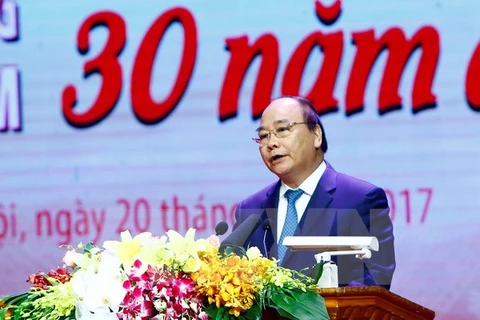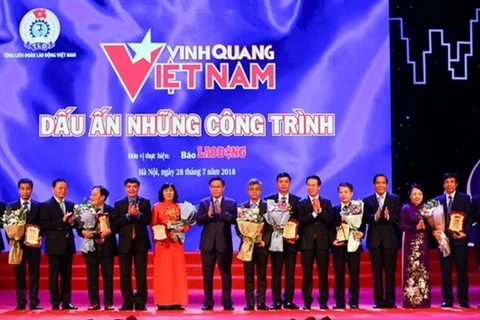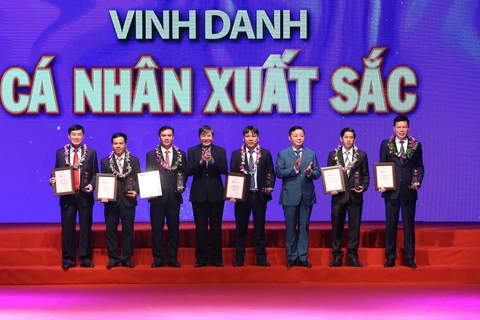Hanoi (VNA) – With innovations in health-check procedures, millions of working hours have been saved and links in health testing alone have saved more than 300 billion VND per year.
On July 7, one collective and one individual of the healthcare sector – the Vietnam Administration of Medical Services under the Ministry of Health and Director of the Vietnam - Germany Hospital Prof. Tran Binh Giang were honoured in the “Vietnam Glory” programme.
The 15th edition of the programme, run by the Vietnam General Confederation of Labour, the Central Committee for Emulation and Rewards and the Lao dong (Labour) newspaper, aimed to honour collectives and individuals for their contributions to the national renewal cause.
The Vietnam Administration of Medical Services was one of seven teams to receive rewards in the 15th edition of the programme.
Nguyen Ngoc Hien, Editor-in-Chief of Lao Dong and head of the programme’s organising board said the agency has introduced many initiatives.
The jury and the organising board highly valued two initiatives, including a set of 83 criteria to evaluate the quality of hospitals with more than 1,500 standards to define the position of the hospitals in terms of quality, helping evaluate their quality in an independent manner.
The second is the establishment of a survey system to evaluate the satisfaction of patients and staff using online software, said Hien.
 Luong Ngoc Khue, head of the Vietnam Administration of Medical Services receives the award on behalf of the agency at the programme (Photo: VietnamPlus).
Luong Ngoc Khue, head of the Vietnam Administration of Medical Services receives the award on behalf of the agency at the programme (Photo: VietnamPlus). The administration’s solution includes the standardisation of hospital ranking criteria and standardisation of evaluation for service quality at the same time. These are two major factors defining the quality of healthcare services.
After five years of implementation, the hospital system has seen positive changes in all aspects from the quality of hospital guards, nurses, doctors and directors, and from the gate to the outpatient departments, patients’ rooms and operation rooms, even in hospitals at districts and remote areas.
Patients have received better medical services, thus becoming more satisfied, while the human resource quality and working conditions of healthcare staff have been improved.
Besides, in the past five years, the administration has worked with other agencies to build effective projects at the ministry and governmental levels.
The projects included those on satellite hospitals, family doctors, the enhancement of professional capacity for healthcare staff in local hospitals and the transfer of technology from central hospitals to satellite hospitals. Thanks to the efforts, many practices have been implemented in local hospitals, limiting the number of patients sent to central hospitals.
At the same time, socio-economic efficiency has been clearly shown. Most central hospitals are less overloaded. With the improvement in health check-up procedures, millions of working hours have been saved.
Prof. Tran Binh Giang, born in 1962, Director of the Vietnam - Germany Hospital and Chairman of the Vietnam Association of Endolaparoscopic Surgeons, Vice President of the Asia-Pacific Association of Endolaparoscopic Surgeons, was among the individuals honoured at the programme.
Prof. Giang was one of the first Vietnamese to study endolaparoscopic surgery and was one of the first to bring the technique to Vietnam and make it a regular practice nationwide.
He was the first to conduct an endolaparoscopic surgery on abdominal aorta and Whipple procedure, which were once only implemented in a number of big centres in the world.
He was also the first to train intensive personnel for the Vietnam-Germany Hospital’s Endolaparoscopic Centre to treat obesity, contributing to an international report on obesity in Asia which was published in an obesity-specialised magazine.
Currently, Prof. Giang is focusing on researching the application of advanced technologies for surgeries to cut off lower colon tumors which are very complicated.-VNA

























